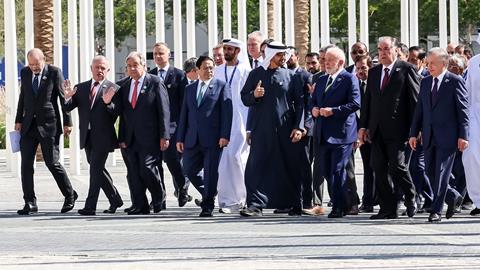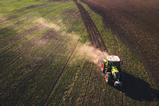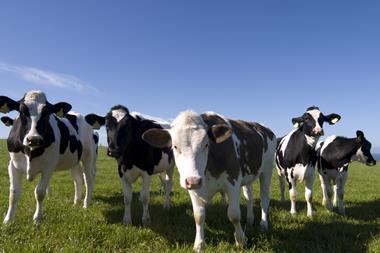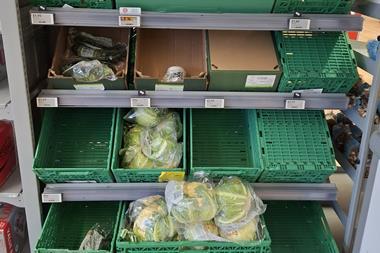After Dubai was announced as the host of this year’s United Nations climate summit, it was clear the food industry would be centre stage.
It was unlikely the petrostate would shine the spotlight on fossil fuels – there was even that story about the UAE planning to use COP as an opportunity to strike oil and gas deals. Quickly, rumours began swirling about how food and agriculture would be a potential focus for this year’s climate talks.
Agrifood systems currently contribute around a third of the greenhouse gas emissions behind global temperature rises. And so, many campaigners realise change is long overdue.
COP28 delegates therefore settled for an overarching, arguably vague, theme: food systems transformation. But as the conference comes to a close, what exactly does this mean? And what have been the key takeaways from this year’s food-focused summit?
Too little focus on sustainable diets
The action started even before the COP28 doors opened on 30 November. In the lead-up to the event, a Food Foundation report found UK government inaction had encouraged food companies to slow their efforts on health and sustainability.
The body’s State of the Nation’s Food Industry 2023 document showed there had been fewer commitments on tackling HFSS, as well as less emphasis on sustainable diets, across the past 12 months – claiming government rowbacks, including the u-turn on HFSS promotions and failure to bring in mandatory reporting on health and carbon emissions, had created a climate that discourages companies from moving the agenda forward.
It’s fair to say a lot was riding on Britain’s appearance in Dubai alongside other world powers – campaigners and audiences alike hoped for some pretty bold commitments.
- Read more: Health and environment action from food companies has slowed, finds Food Foundation report
Food and agriculture’s climate change impact
Over 130 world leaders pledged at the start of the event to slash the impact food and agriculture have on driving climate change. A landmark declaration about food systems transformation was announced on the second day of the UN climate conference in Dubai, where King Charles joined other leaders to address the effects of the global food industry on the environment.
The countries that signed up to the Emirates Declaration on Sustainable Agriculture, Resilient Food Systems and Climate Action – including the UK, the EU, China and the US – should now prioritise food carbon emissions in their efforts to tackle global warming as they work towards the net zero by 2050 goal, as per the new pledge.
Disclosing dairy emissions
In another landmark move, global dairy industry leaders for the first time committed to disclosing their methane emissions.
Nestlé, Danone, General Mills, Kraft Heinz, Bel Group and Lactalis all signed up to the Dairy Methane Action Alliance (DMAA) pact, with a pledge to disclose annual emissions from their dairy supply chains and “create and implement a comprehensive methane action plan”.
Agriculture accounts for nearly 40% of human-caused methane emissions, the majority of which comes from livestock, according to the Environmental Defense Fund (EDF) – the non-profit organisation mediating the group. The six dairy giants represent more than $200bn in revenues.
Slash global supply chain carbon emissions
Logistics was also in the limelight as businesses called for an increase to the standard frozen temperature metric to slash carbon emissions in global supply chains.
A group of leading industry names, including the UK’s Cold Chain Federation, the Global Cold Chain Alliance, DP World (one of COP28’s ‘principal pathway partners’) and the MSC, want food to be stored and transported at –15°C (rather than the current –18°C) to save energy as the sector transitions to a net zero model.
The calls from the coalition come as a study found raising the temperature by three degrees could cut costs in the supply chain of between 5% and 12%.
Front-of-pack eco-labelling
It was meant to be a timely announcement with COP underway, but IGD’s plan to join industry together for a single front-of-pack eco-label was instead met by a furious backlash from eco campaigners, who claimed it relied on “dumbed down” data that ignored key environmental and animal welfare concerns.
Ban on commodities linked to illegal deforestation
The UK government has finally announced a ban on imported commodities linked to illegal deforestation, after a two-year delay.
In a move similar to the EU’s anti-deforestation law implemented in June, Britain will impose strict due diligence regulations on importers of beef, leather, soy, palm oil, and cocoa.
Businesses with at least £50m in global turnover that trade more than 500 tonnes of the regulated commodities in their operations need to produce a declaration showing their imports did not come from illegally deforested lands.
And despite widespread support in a Defra consultation last year, the government has not included coffee in the list of commodities.
Aims to tackle world hunger
The best was saved for last though, with the biggest announcement of the summit arriving just as it drew to a close. The UN laid out a first-of-its-kind food systems strategy that aims to tackle world hunger, while staying within internationally agreed global warming targets.
The agency’s Food and Agriculture Organization (FAO) rolled out a global roadmap which sets out detailed goals for food systems to remain within 1.5°C while feeding a growing population.
The roadmap’s first instalment sets out a series of key targets across “priority areas” such as livestock, soil and water, crops and diets, with more detailed regional and national action plans to be unveiled at the next two summits.
Fossil fuels are here to stay
The UN’s draft text – the initial version of the deal it hopes to reach at the Dubai summit – will not force countries to phase out fossil fuels entirely, a key demand by the EU and many climate-vulnerable countries, instead opting for the term “reduce”.
There is a lot of focus on renewable energy investing, but many have already expressed their disappointment at the lack of concrete action coming out of this year’s conference.

























No comments yet